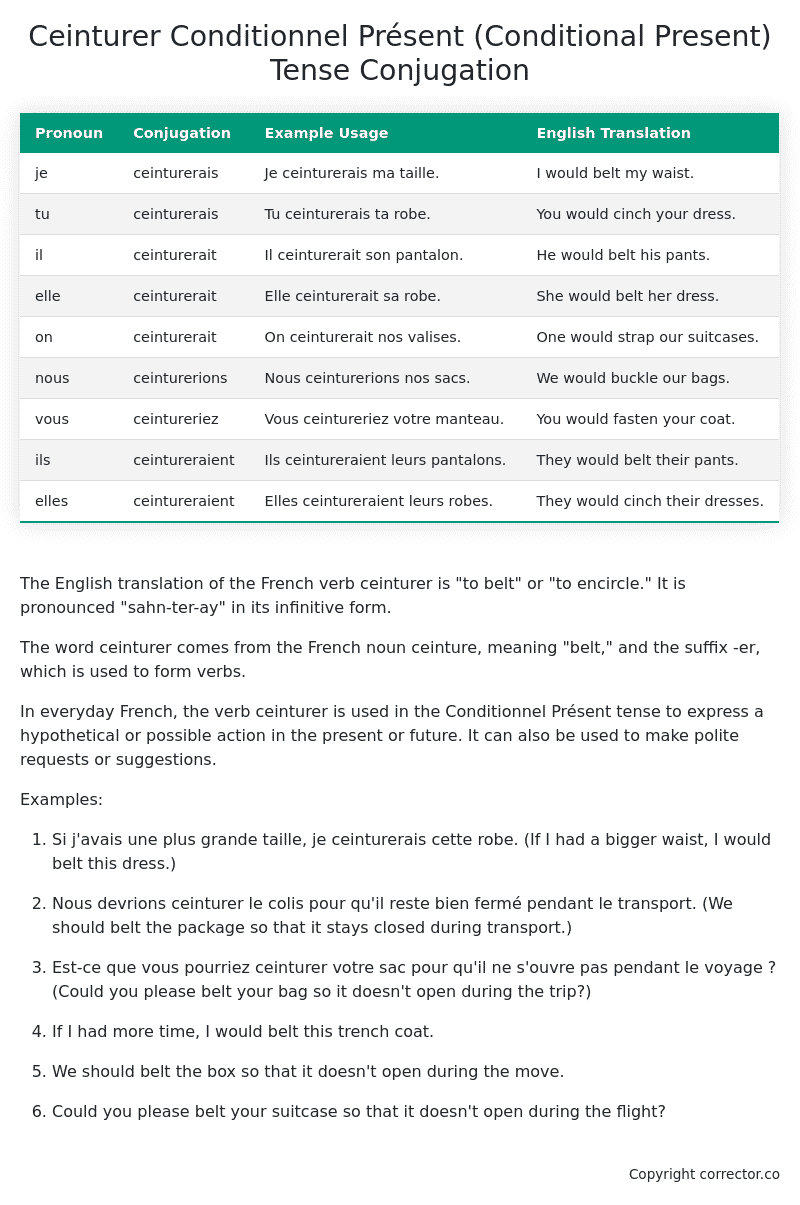Conditionnel Présent (Conditional Present) Tense Conjugation of the French Verb ceinturer
Introduction to the verb ceinturer
The English translation of the French verb ceinturer is “to belt” or “to encircle.” It is pronounced “sahn-ter-ay” in its infinitive form.
The word ceinturer comes from the French noun ceinture, meaning “belt,” and the suffix -er, which is used to form verbs.
In everyday French, the verb ceinturer is used in the Conditionnel Présent tense to express a hypothetical or possible action in the present or future. It can also be used to make polite requests or suggestions.
Examples:
-
Si j’avais une plus grande taille, je ceinturerais cette robe. (If I had a bigger waist, I would belt this dress.)
-
Nous devrions ceinturer le colis pour qu’il reste bien fermé pendant le transport. (We should belt the package so that it stays closed during transport.)
-
Est-ce que vous pourriez ceinturer votre sac pour qu’il ne s’ouvre pas pendant le voyage ? (Could you please belt your bag so it doesn’t open during the trip?)
-
If I had more time, I would belt this trench coat.
-
We should belt the box so that it doesn’t open during the move.
-
Could you please belt your suitcase so that it doesn’t open during the flight?
Table of the Conditionnel Présent (Conditional Present) Tense Conjugation of ceinturer
| Pronoun | Conjugation | Example Usage | English Translation |
|---|---|---|---|
| je | ceinturerais | Je ceinturerais ma taille. | I would belt my waist. |
| tu | ceinturerais | Tu ceinturerais ta robe. | You would cinch your dress. |
| il | ceinturerait | Il ceinturerait son pantalon. | He would belt his pants. |
| elle | ceinturerait | Elle ceinturerait sa robe. | She would belt her dress. |
| on | ceinturerait | On ceinturerait nos valises. | One would strap our suitcases. |
| nous | ceinturerions | Nous ceinturerions nos sacs. | We would buckle our bags. |
| vous | ceintureriez | Vous ceintureriez votre manteau. | You would fasten your coat. |
| ils | ceintureraient | Ils ceintureraient leurs pantalons. | They would belt their pants. |
| elles | ceintureraient | Elles ceintureraient leurs robes. | They would cinch their dresses. |
Other Conjugations for Ceinturer.
Le Present (Present Tense) Conjugation of the French Verb ceinturer
Imparfait (Imperfect) Tense Conjugation of the French Verb ceinturer
Passé Simple (Simple Past) Tense Conjugation of the French Verb ceinturer
Passé Composé (Present Perfect) Tense Conjugation of the French Verb ceinturer
Futur Simple (Simple Future) Tense Conjugation of the French Verb ceinturer
Futur Proche (Near Future) Tense Conjugation of the French Verb ceinturer
Plus-que-parfait (Pluperfect) Tense Conjugation of the French Verb ceinturer
Passé Antérieur (Past Anterior) Tense Conjugation of the French Verb ceinturer
Futur Antérieur (Future Anterior) Tense Conjugation of the French Verb ceinturer
Subjonctif Présent (Subjunctive Present) Tense Conjugation of the French Verb ceinturer
Subjonctif Passé (Subjunctive Past) Tense Conjugation of the French Verb ceinturer
Subjonctif Imparfait (Subjunctive Imperfect) Tense Conjugation of the French Verb ceinturer
Subjonctif Plus-que-parfait (Subjunctive Pluperfect) Tense Conjugation of the French Verb ceinturer
Conditionnel Présent (Conditional Present) Tense Conjugation of the French Verb ceinturer (this article)
Conditionnel Passé (Conditional Past) Tense Conjugation of the French Verb ceinturer
L’impératif Présent (Imperative Present) Tense Conjugation of the French Verb ceinturer
L’infinitif Présent (Infinitive Present) Tense Conjugation of the French Verb ceinturer
Struggling with French verbs or the language in general? Why not use our free French Grammar Checker – no registration required!
Get a FREE Download Study Sheet of this Conjugation 🔥
Simply right click the image below, click “save image” and get your free reference for the ceinturer Conditionnel Présent tense conjugation!

Ceinturer – About the French Conditionnel Présent (Conditional Present) Tense
Formation
Common Everyday Usage Patterns
Expressing Polite Requests
Expressing Hypothetical Situations
Expressing Doubt or Uncertainty
Interactions with Other Tenses
Present Tense
Past Tense
Future Tense
Conditional Perfect
Summary
Want More?
I hope you enjoyed this article on the verb ceinturer. Still in a learning mood? Check out another TOTALLY random French verb conjugation!


